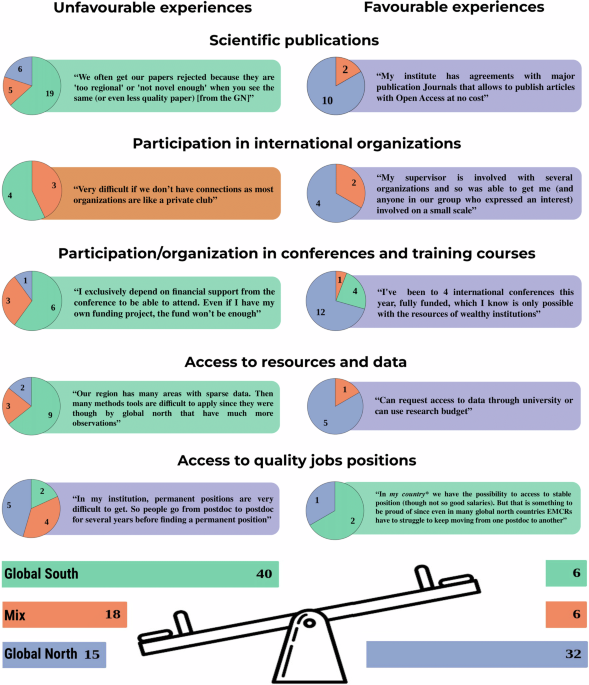The Global South participants reported significant challenges including lack of infrastructure, access to cutting-edge technology, electricity, internet, technical support, data availability, and computer resources. In contrast, the only resource that occasionally limits the Global North participants was funding (Figs. 1 and S4).
One of the main difficulties for the Global South participants is the lack of data in their Global South study areas and the challenges of accessing existing data. They also spend a lot of time dealing with issues related to computer resources, internet connectivity, and infrastructure due to limited technical support, whereas the Global North participants reported dedicated institutional support for these tasks.
At the international level, basic infrastructure needs could be addressed through development assistance and investment by large Global North funding agencies. Supporting scholarships and research placements for Global South researchers in Global North institutions could encourage and strengthen long-term collaboration. Projects focused on Global South issues need funding, including expenses like software licenses and access to scientific databases. The extensive production of high-quality open source data and software is another way to help reduce resource barriers.
At the national level, Global South researchers communities need to lobby their governments to support research and to provide the infrastructure to enable cutting-edge research.
Fair pay, opportunities near home, and stable careers are global challenges
Although they face different challenges, greater job stability is crucial in both the Global North and Global South (Figs. 1 and S5).
Global South participants noted unfair competition for jobs: they often compete with Global North researchers with more attractive curriculum vitae, influenced by the inequalities reported above. Secondly, although some Global South countries may offer relatively easier access to permanent jobs, salaries are typically insufficient to cover living costs. In contrast, in some Global North countries it can be challenging to obtain a permanent position, but postdoctoral salaries are often sufficient to cover living costs. This leads the Global South participants to consider relocating to countries of the Global North, despite the challenges of securing permanent employment there.
To tackle key environmental challenges, Global South science bodies need to increase the number of positions in Earth sciences; better salaries are required to attract and retain talented scientists. At the international level, the development of collaborations and funding programmes that specifically support Global South researchers in their home countries could be encouraged. Global North-funded projects that are developed in the Global South would ensure the employment and contribution of local Global South researchers.
Bridging the gap
As a scientific community, we are challenged to increase the relevance, impact, and utility of our research for science and society. We need to drive transformative actions in the context of the urgent need to address sustainability10. Adding to this global challenge, geographical inequalities further hinder research and its impact.
The experiences shared in the workshop on early- to mid-career perspectives on Global South-North inequalities highlight significant disparities in the production of Earth science knowledge. The Global South participants mainly shared challenges, while Global North participants described both positive and negative experiences (Fig. 1).
As a result of these persistent inequalities, the scientific communities of the Global South are being held back in their contribution to Earth science knowledge creation, to the detriment of their societies. This leads to unequal adaptation to environmental risks, aggravating climate injustice.
To balance the seesaw, we propose the following actions:
Publishers:
– Offer fee waivers for Global South researchers.
– Include Global South researchers on editorial boards.
– Adopt double-anonymized peer reviews to minimize bias.
– Account for resources and data limitations when evaluating submissions.
– Publish regional submission and acceptance statistics.
If we are to seek an equitable way to sustainability, we can no longer ignore Global South-North science inequality. As a united Earth science community, we have the agency and responsibility to take action and promote fair global scientific collaboration.
